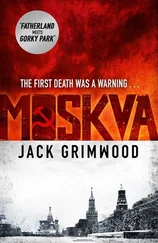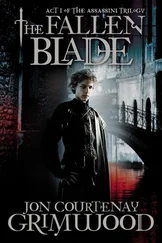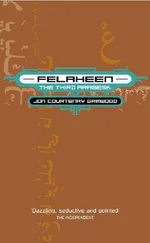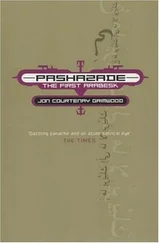Jeff nodded distractedly. "That’s it?" he asked.
"Yes, sir, except for a few more magazines, all trying to arrange an exclusive interview with you or Miss Phillips, or both."
"Any scholarly journals among them?"
She shook her head. "The National Enquirer, Fate … I guess you could say the most serious of them was Esquire."
"Still no word from any of the universities? No research foundations other than this outfit in California, whatever it may be?"
"No, sir. That’s the whole list."
"All right." He sighed. "Thank you, Elaine; keep me posted."
"I will, sir." She folded her pad, started to go, then paused. "Mr. Winston … I was just wondering…"
"Yes?"
"Do you think I ought to get married? I mean, I’ve been thinking about it, and my boyfriend’s asked me twice, but I’d like to know … well, I’d like to know whether it would work out or not."
Jeff smiled tolerantly, saw the desperate desire for foresight in the young woman’s eyes. "I wish I knew," he told her. "But that’s something you’re going to have to discover for yourself."
Aeronaves de Mexico dropped its lawsuit on June fifth, the day after one of its jet liners crashed into a mountainside near Monterrey, as Jeff and Pamela had predicted. Mexican political leader Carlos Madrazo and tennis star Rafael Osuna were not on board the plane in which they had died five times before; only eleven people had seen fit to take the doomed flight this time, not seventy-nine.
After that, of the remaining airlines for whom disaster had been foretold, only Air Algérie and Royal Nepal Airlines chose to ignore the warning and not cancel the flights in question. Those two companies suffered the only fatal accidents in all of the world’s commercial aviation for the rest of 1969.
The U.S. Navy refused to bow to what Defense Secretary Laird called "superstition," and the destroyer Evans proceeded on course in the South China Sea; but the Australian government quietly ordered its aircraft carrier Melbourne to cut engines and drop anchor for the first week of June, and the collision that had always sliced the Evans in half never happened.
The death toll in the Fourth of July Lake Erie floods in northern Ohio was down from forty-one to five, as residents heeded the highly publicized alerts and sought higher ground before the storms hit. A similar situation prevailed in Mississippi; tourist bookings at the Gulf Coast resorts of Gulfport and Biloxi were down to almost nothing for mid-August, and the local populace fled inland at a rate never before achieved by mere civil-defense warnings. Hurricane Camille struck a nearly deserted coastline, and 138 of her previous 149 victims survived.
Lives changed. Lives went on, where they had never continued before. And the world took note.
"I want an injunction filed now, Mitchell! This week, if we can; the middle of next, at the latest."
The lawyer concentrated on his glasses, polishing the thick lenses with a precision befitting the care that might be taken with an expensive telescope. "I don’t know, Jeff," he said. "I’m not sure that’ll be possible."
"How soon can we get it, then?" asked Pamela.
"We may not be able to," Wade admitted.
"You mean not at all? These people are free to go on spewing their ridiculous fantasies about us, and there’s nothing we can do about it?"
The attorney found another invisible spot on one of his lenses, wiped it away delicately with a little square of chamois. "They may well be acting within their First Amendment rights."
"They’re leeching off us!" Jeff exploded, waving the pamphlet that had prompted this meeting. His photograph was prominent on the cover of the booklet, along with a slightly smaller picture of Pamela. "They’re profiting from our names and our statements, with no authorization from us, and in the process they’re making a mockery of everything we’ve tried to do."
"They are a nonprofit organization," Wade reminded him. "And they’ve filed for tax-exempt status as a religious institution. That kind of thing is hard to fight; it takes years, and the chances for beating them are slim."
"What about the libel laws?" Pamela insisted.
"You’ve made yourselves public figures; that doesn’t leave you with much protection. And I’m not sure their comments about you could be construed as libelous, anyway. A jury might even see it as the opposite extreme. These people worship you. They believe you’re the incarnation of God on earth. I think you’re better off just ignoring them; legal action would only give them more publicity."
Jeff made a wordless exclamation of disgust, crumpled the pamphlet in one hand, and threw it toward the far corner of his office. "This is just the kind of thing we wanted to avoid," he said, fuming. "Even if we ignore it or deny it, it taints us by association. No reputable scientific organization is going to want to have anything to do with us after this."
The lawyer slipped his glasses back on, adjusted them on the bridge of his nose with one thick forefinger. "I understand your dilemma," he told them. "But I don’t—"
The intercom on Jeff’s desk buzzed in two short bursts followed by a single long one, the signal he had established for notification of an urgent message.
"Yes, Elaine?"
"There’s a gentleman here to see you, sir. He says he’s with the federal government."
"What branch? Civil defense, the National Science Foundation?"
"The State Department, sir. He insists on speaking with you personally. You and Miss Phillips both."
"Jeff?" Wade frowned. "Want me to sit in on this?"
"Maybe," Jeff told him. "Let’s see what he wants." Jeff keyed the intercom again. "Show him in, Elaine."
The man she brought into the office was in his mid-forties, balding, with alert blue eyes and nicotine-stained fingers. He sized up Jeff with a quick, penetrating glance, did the same to Pamela, then looked at Mitchell Wade.
"I’d prefer we had this talk in private," the man said.
Wade stood, introduced himself. "I’m Mr. Winston’s attorney," he said. "I also represent Miss Phillips."
The man pulled a thin billfold from his jacket pocket, handed Wade and Jeff his card. "Russell Hedges, U.S. Department of State. I’m afraid the nature of what I have to discuss here is confidential. Would you mind, Mr. Wade?"
"Yes, I would mind. My clients have a right to—"
"No legal advice is required in this situation," Hedges said. "This concerns a matter of national security."
The attorney started to protest once more, but Jeff stopped him. "It’s all right, Mitchell. I’d like to hear him out. Think over what we were talking about before, and let me know if you come up with any workable alternatives; I’ll give you a call tomorrow."
"Call me today if you need to," Wade said, casting a scowl at the government representative. "I’ll be in my office late, probably till six or six-thirty."
"Thanks. We’ll get in touch if necessary."
"Mind if I smoke?" Hedges asked, pulling out a pack of Camels as the lawyer left the room.
"Go right ahead." Jeff motioned him to one of the seats facing the desk and slid an ashtray within his reach. Hedges produced a box of wooden matches, lit his cigarette with one. He let the match burn slowly to a blackened stub, which he dropped, still smoldering, into the large glass ashtray.
"We’ve been aware of you, of course," Hedges said at length. "Difficult not to be, what with the media spotlight you’ve been in for the past four months. Though I must admit, most of my colleagues have tended to dismiss your pronouncements as parlor tricks … until this week."
"Libya?" Jeff asked, knowing the answer.
Hedges nodded, took a long drag from the cigarette. "Everyone at the Middle East desk is still thunderstruck; our most reliable intelligence assessments indicated King Idris had a thoroughly stable regime. You not only named the date of the coup; you specified that the junta would come from the middle echelons of the Libyan army. I want you to tell me how you knew all that."
Читать дальше












